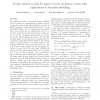Free Online Productivity Tools
i2Speak
i2Symbol
i2OCR
iTex2Img
iWeb2Print
iWeb2Shot
i2Type
iPdf2Split
iPdf2Merge
i2Bopomofo
i2Arabic
i2Style
i2Image
i2PDF
iLatex2Rtf
Sci2ools
SODA
2016
ACM
2016
ACM
Nearly-optimal bounds for sparse recovery in generic norms, with applications to k-median sketching
We initiate the study of trade-offs between sparsity and the number of measurements in sparse recovery schemes for generic norms. Specifically, for a norm · , sparsity parameter k, approximation factor K > 0, and probability of failure P > 0, we ask: what is the minimal value of m so that there is a distribution over m × n matrices A with the property that for any x, given Ax, we can recover a k-sparse approximation to x in the given norm with probability at least 1 − P? We give a partial answer to this problem, by showing that for norms that admit efficient linear sketches, the optimal number of measurements m is closely related to the doubling dimension of the metric induced by the norm · on the set of all k-sparse vectors. By applying our result to specific norms, we cast known measurement bounds in our general framework (for the p norms, p ∈ [1, 2]) as well as provide new, measurementefficient schemes (for the Earth-Mover Distance norm). The latter result directly ...
Algorithms | SODA 2016 |
| Added | 09 Apr 2016 |
| Updated | 09 Apr 2016 |
| Type | Journal |
| Year | 2016 |
| Where | SODA |
| Authors | Arturs Backurs, Piotr Indyk, Ilya Razenshteyn, David P. Woodruff |
Comments (0)

